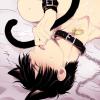Killing Off Characters
When writing your stories and creating a tapestry of drama and conflict, occasionally putting your readers through a roller coaster ride of ups and downs from beginning to end...you may make the choice to lose a character or two in the process. It happens. It's a part of more stories than most people realize. In fact, with very few exceptions, all of your favorite Disney cartoons from when you were young...have an orphaned protagonist. From Peter Pan, to Bambi, to Dumbo, to Aladdin, to Cinderella, to The Jungle Book, to The Lion king...all of them have either been permanently separated from their parents, or have their parents violently murdered in the first act! It's practically a Disney cliche at this point. Death happens often in the stories we create and the stories we read. Hell, even the BIBLE kills off its main protagonist at a certain point in the story! Hehehe...oops! Spoiler alert! That 'Jesus' guy? He doesn't make it out alive! Very sad.
But, if you want the death of a major character to be a part of your story, and you want it to be a part of your project, then I say go for it! Just make sure that it has some sort of meaning, and that it is bringing about the desired dramatic effect for the story you're trying to tell. That's the most important thing to remember in this mess, hehehe!
I've only killed off a few characters in my stories online (But i won't say who, because...'drama'), but I've definitely learned a lot from doing so. I would like to share that knowledge with you guys this week. So let's talk about killing off characters, shall we?
I think the first thing that we, as authors, should be aware of...is the supposed need to create an 'event' to push our stories forward. It's been my experience that it is a total coin toss as to whether this will work to your story's benefit or not. The death of a main and beloved character can be both tragic and upsetting to your audience, and I'd assume that was your intention in killing them off in the first place. However, the big question that you should have playing over and over again in your mind is...why? Why are you killing this character? What will his/her death mean, and how will it affect the rest of the story? There's nothing more frustrating than having someone bumped off for no real reason, and then not having that death have any impact on the rest of the plot. It's almost like, "Well, why were they ever introduced in the first place?" You know? It's like when you watch a horror movie, and the main character sees all of their best friends and family members slaughtered and gutted in the goriest ways imaginable...and two minutes later they seem totally unphased by that. Hehehe, ummm...no! To say that seeing something like that should be highly traumatic is an understatement. But, what can you do? Horror stories need fodder to be scary sometimes. ::Shrugs::
Always remember that your readers are attempting to relate and invest time and emotion into the characters that you create with your writing. So if you're going to give one of them the axe, then you'd better make it count for something. If you're doing it for shock value or to subvert expectations by taking off the plot armor and nothing else? Chances are, your readers aren't going to like that a whole lot. In fact, it can end up backfiring on you in a major way. So I think that it's something that needs to be plotted out and planned for ahead of time, and a reason for your character's untimely demise should have a certain impact on the rest of the characters in the story. It should bring about some sort of awareness, or trigger some level of growth for your protagonist. And this all has to be planned ahead of time. It needs a build up. Readers have to care about this character and be shocked and awed by the fact that they're no longer going to be a part of the story. Which is tragic and hurtful to the people who loved that character...but if you show echoes of their impact on the main character, then your audience may just nod their heads and think, "Well, it's a shame that this person had to die...but I get it now." And THAT will give their death meaning, making it a cathartic part of your protagonist's evolution into the person that you wanted him/her to be.
Now, if you're looking for opportunities to kill off a character in your story...and give your main character a "Noooooooo!!!" moment while dropping to his knees and screaming up at the sky, hehehe? Then I would, personally, narrow it down to three specific 'types' of character deaths. I use this as my three-point guide as to how I want the death of a character to affect my story. There are different degrees of reader attachment and story plot elements that you have to play with here, and each one affects your story in a different way, depending on where you place it. So give it some thought, and see which one might be right for you.
Level 1 - "The Catalyst"
When you place a character death near the beginning of a story...this automatically signals your audience that this is going to be the 'jump off' point that will ultimately set everything else in motion. The character that dies only needs a minimal introduction and little background information, but should be seen as someone that is goodhearted and important to the main character. You will only have a short time to develop this character and make his death meaningful when it happens, but it doesn't have to be an epic look into who they are. Their death is what you use to ignite the spark you need to get the story going. Nothing more.
For example...Bruce Wayne's parents get murdered in an alley by a guy with a gun in Gotham City. That's the catalyst for him to grow up and become Batman. Uncle Ben gets killed, and it becomes the reason that Peter Parker decides to become Spiderman. These deaths are a significant part of your story's beginning, and you can use that plot device to explain why your main character does what he does, and creates opportunities for your readers to connect with his reasoning.
Level 2 - "The Escalation"
Now...if you have a character die in the middle of your story, or near the end of the second act...this can be used to escalate the tension in your project and truly raise the stakes when it comes to what your main characters are trying to accomplish. This time...you have much more time to flesh out the character that you want to 'bump off' later on. You get your audience to get to know them more intimately, and therefore, their sudden death becomes much more heartbreaking. If you've spent the proper amount of time building this character up and making him/her a special part of your story's cast...only to have him suddenly bite the dust...the reaction will be MAJOR! It immediately takes your story and ramps it up to heights that your readers might not have expected. It creates a sense of dread, because, "I LOVED this character! And if this person can be killed off....who might be next?"
When you kill off an important character mid story, you're letting your audience know, explicitly, that the gloves are coming off, and anything is possible now. It's a flare to signal the masses that things just hit a new level of 'bad', and that your favorite characters are facing real danger now. This is a writing tool that you can use to heighten tension and set your future events in motion, making them a frightening ride for anyone who bares witness as they cling to every word, wondering where things are going next.
Level 3 - "The Sacrificial Lamb"
Now this method is most often used when you reach the climax of your story. And it is just as advertised. The 'Sacrificial Lamb'. When you write a major character death near the end of your story, it is often seen as a noble sacrifice for the greater good of whatever it was that the protagonist was fighting for. This can also have a hugely dramatic effect on your story, as the person sacrificing their life is usually the one who has made the protagonist's journey towards winning the day complete. At this point, you're dealing with a character that has usually been along for the entire ride, and that readers have come to love and adore along the way. So...word to the wise...if you're going to kill this person off...have them bite the big one doing something important. Don't just knock them off over something petty. You've got an opportunity to really engage your readers emotionally with their sacrifice...don't waste it! Give them a send off that you think is worthy of your reader's attachment and emotional investment in them from the very beginning. Have it mean something. I think that Level Three is the most important and touchiest writing tool of them all. Missing a step on this one can either get your audience to cry and keep reading...or it can totally piss them off and cause them to stop reading entirely. So be careful. Like I said...it's all about planning things ahead of time. Make sure you have your act together, and build up to the ending you want your story to have. Even if your protagonist dies at the end...make it worth the reader's time to have him/her go out with a bang. You know?
So there it is! Comsie's personal guide to killing off characters and not traumatizing your audience in the process! Hehehe! Just remember that a character death in a story should have the same impact as a death in your own life. Things change. They shift. You don't just lose someone and go on as if it never happened. If you're going to kill off a character, ask yourself why, and how will this affect the story in the long run? If you can't answer that question, then don't kill them off. Put them on a bus and send them to Detroit or something! LOL! Death isn't something to take lightly, even in online fiction. So get it right! K? ![]()
I hope this helps! And I'll see you guys next weekend!
-
 10
10
-
 2
2








12 Comments
Recommended Comments
Create an account or sign in to comment
You need to be a member in order to leave a comment
Create an account
Sign up for a new account in our community. It's easy!
Register a new accountSign in
Already have an account? Sign in here.
Sign In Now